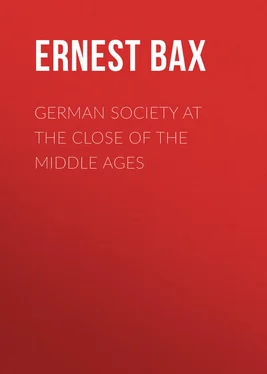Ernest Bax - German Society at the Close of the Middle Ages
Здесь есть возможность читать онлайн «Ernest Bax - German Society at the Close of the Middle Ages» — ознакомительный отрывок электронной книги совершенно бесплатно, а после прочтения отрывка купить полную версию. В некоторых случаях можно слушать аудио, скачать через торрент в формате fb2 и присутствует краткое содержание. Жанр: foreign_antique, foreign_prose, на английском языке. Описание произведения, (предисловие) а так же отзывы посетителей доступны на портале библиотеки ЛибКат.
- Название:German Society at the Close of the Middle Ages
- Автор:
- Жанр:
- Год:неизвестен
- ISBN:нет данных
- Рейтинг книги:5 / 5. Голосов: 1
-
Избранное:Добавить в избранное
- Отзывы:
-
Ваша оценка:
- 100
- 1
- 2
- 3
- 4
- 5
German Society at the Close of the Middle Ages: краткое содержание, описание и аннотация
Предлагаем к чтению аннотацию, описание, краткое содержание или предисловие (зависит от того, что написал сам автор книги «German Society at the Close of the Middle Ages»). Если вы не нашли необходимую информацию о книге — напишите в комментариях, мы постараемся отыскать её.
German Society at the Close of the Middle Ages — читать онлайн ознакомительный отрывок
Ниже представлен текст книги, разбитый по страницам. Система сохранения места последней прочитанной страницы, позволяет с удобством читать онлайн бесплатно книгу «German Society at the Close of the Middle Ages», без необходимости каждый раз заново искать на чём Вы остановились. Поставьте закладку, и сможете в любой момент перейти на страницу, на которой закончили чтение.
Интервал:
Закладка:
Besides these things, there was the dawning interest in nature, which took on, as a matter of course, a magical form in accordance with traditional and contemporary modes of thought. In fact, like the flicker of a dying candle in its socket, the Middle Ages seemed at the beginning of the sixteenth century to exhibit all their own salient characteristics in an exaggerated and distorted form. The old feudal relations had degenerated into a blood-sucking oppression; the old rough brutality, into excogitated and elaborated cruelty (aptly illustrated in the collection of ingenious instruments preserved in the Torture-tower at Nürnberg); the old crude superstition, into a systematised magical theory of natural causes and effects; the old love of pageantry, into a lavish luxury and magnificence of which we have in the "field of the cloth of gold" the stock historical example; the old chivalry, into the mercenary bravery of the soldier, whose trade it was to fight, and who recognised only one virtue – to wit, animal courage. Again, all these exaggerated characteristics were mixed with new elements, which distorted them further, and which fore-shadowed a coming change, the ultimate issue of which would be their extinction and that of the life of which they were the signs.
The growing tendency towards centralisation and the consequent suppression or curtailment of the local autonomies of the Middle Ages in the interests of some kind of national government, of which the political careers of Louis XI. in France, of Edward IV. in England, and of Ferdinand and Isabella in Spain were such conspicuous instances, did not fail to affect in a lesser degree that loosely connected political system of German States known as the Holy Roman Empire. Maximilian's first Reichstag in 1495 caused to be issued an imperial edict suppressing the right of private warfare claimed and exercised by the whole noble class from the princes of the Empire down to the meanest knight. In the same year the Imperial Chamber ( Reichskammer ) was established, and in 1501 the Imperial Aulic Council. Maximilian also organised a standing army of mercenary troops, called Landesknechte . Shortly afterwards Germany was divided into imperial districts called circles ( Kreise ), ultimately ten in number, all of which were under a Reichsregiment , which had at its disposal a military force for the punishment of disturbers of the peace. But the public opinion of the age, conjoined with the particular circumstances, political and economic, of central Europe, robbed the enactment in a great measure of its immediate effect. Highway plundering and even private war was still going on, to a considerable extent, far into the sixteenth century. Charles V. pursued the same line of policy; but it was not until after the suppression of the lower nobility in 1523, and finally of the peasants in 1526, that any material change took place; and then the centralisation, such as it was, was in favour of the princes, rather than of the imperial power, which, after Charles V.'s time, grew weaker and weaker. The speciality about the history of Germany is, that it has not known till our own day centralisation on a national or racial scale like England or France.
At the opening of the sixteenth century public opinion not merely sanctioned open plunder by the wearer of spurs and by the possessor of a stronghold, but regarded it as his special prerogative, the exercise of which was honourable rather than disgraceful. The cities certainly resented their burghers being waylaid and robbed, and hanged the knights whenever they could; and something like a perpetual feud always existed between the wealthier cities and the knights who infested the trade routes leading to and from them. Still, these belligerent relations were taken as a matter of course; and no disgrace, in the modern sense, attached to the occupation of highway robbery.
In consequence of the impoverishment of the knights at this period, owing to causes with which we shall deal later, the trade or profession had recently received an accession of vigour, and at the same time was carried on more brutally and mercilessly than ever before. We will give some instances of the sort of occurrence which was by no means unusual. In the immediate neighbourhood of Nürnberg, which was bien entendu one of the chief seats of the imperial power, a robber-knight leader, named Hans Thomas von Absberg, was a standing menace. It was the custom of this ruffian, who had a large following, to plunder even the poorest who came from the city, and, not content with this, to mutilate his victims. In June, 1522, he fell upon a wretched craftsman, and with his own sword hacked off the poor fellow's right hand, notwithstanding that the man begged him upon his knees to take the left, and not destroy his means of earning his livelihood. The following August he, with his band, attacked a Nürnberg tanner, whose hand was similarly treated, one of his associates remarking that he was glad to set to work again, as it was "a long time since they had done any business in hands". On the same occasion a cutler was dealt with after a similar fashion. The hands in these cases were collected and sent to the Bürgermeister of Nürnberg, with some such phrase as that the sender (Hans Thomas) would treat all so who came from the city. The princes themselves, when it suited their purpose, did not hesitate to offer an asylum to these knightly robbers. With Absberg were associated Georg von Giech and Hans Georg von Aufsess. Among other notable robber-knights of the time may be mentioned the Lord of Brandenstein and the Lord of Rosenberg. As illustrating the strictly professional character of the pursuit, and the brutally callous nature of the society practising it, we may narrate that Margaretha von Brandenstein was accustomed, it is recorded, to give the advice to the choice guests round her board that when a merchant failed to keep his promise to them, they should never hesitate to cut off both his hands. Even Franz von Sickingen, known sometimes as the "last flower of German chivalry," boasted of having among the intimate associates of his enterprise for the rehabilitation of knighthood many gentlemen who had been accustomed to "let their horses on the high road bite off the purses of wayfarers". So strong was the public opinion of the noble class as to the inviolability of the privilege of highway plunder that a monk, preaching one day in a cathedral and happening to attack it as unjustifiable, narrowly escaped death at the hands of some knights present amongst his congregation, who asserted that he had insulted the prerogatives of their order. Whenever this form of knight-errantry was criticised, there were never wanting scholarly pens to defend it as a legitimate means of aristocratic livelihood; since a knight must live in suitable style, and this was often his only resource for obtaining the means thereto.
The free cities, which were subject only to imperial jurisdiction, were practically independent republics. Their organisation was a microcosm of that of the entire Empire. At the apex of the municipal society was the Bürgermeister and the so-called "Honorability" ( Ehrbarkeit ), which consisted of the patrician gentes , (in most cases) those families which were supposed to be descended from the original chartered freemen of the town, the old Mark-brethren. They comprised generally the richest families, and had monopolised the entire government of the city, together with the right to administer its various sources of income and to consume its revenue at their pleasure. By the time, however, of which we are writing the trading guilds had also attained to a separate power of their own, and were in some cases ousting the burgher-aristocracy, though they were very generally susceptible of being manipulated by the members of the patrician class, who, as a rule, could alone sit in the Council ( Rath ). The latter body stood, in fact, as regards the town, much in the relation of the feudal lord to his manor. Strong in their wealth and in their aristocratic privileges, the patricians lorded it alike over the townspeople and over the neighbouring peasantry, who were subject to the municipality. They forestalled and regrated with impunity. They assumed the chief rights in the municipal lands, in many cases imposed duties at their own caprice, and turned guild privileges and rights of citizenship into a source of profit for themselves. Their bailiffs in the country districts forming part of their territory were often more voracious in their treatment of the peasants than even the nobles themselves. The accounts of income and expenditure were kept in the loosest manner, and embezzlement clumsily concealed was the rule rather than the exception.
Читать дальшеИнтервал:
Закладка:
Похожие книги на «German Society at the Close of the Middle Ages»
Представляем Вашему вниманию похожие книги на «German Society at the Close of the Middle Ages» списком для выбора. Мы отобрали схожую по названию и смыслу литературу в надежде предоставить читателям больше вариантов отыскать новые, интересные, ещё непрочитанные произведения.
Обсуждение, отзывы о книге «German Society at the Close of the Middle Ages» и просто собственные мнения читателей. Оставьте ваши комментарии, напишите, что Вы думаете о произведении, его смысле или главных героях. Укажите что конкретно понравилось, а что нет, и почему Вы так считаете.










